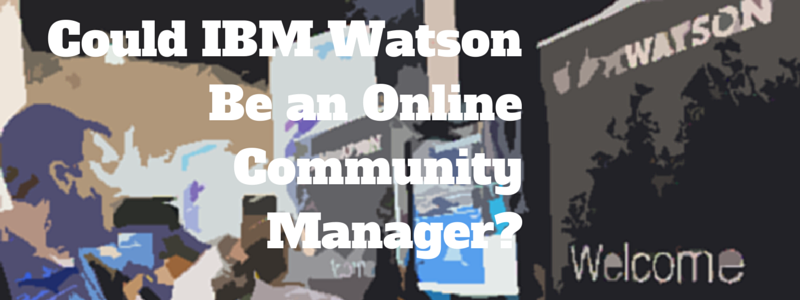
Your typical community manager: two eyes, two ears, two hands. Between 5 and 6 feet high, 150 to 225 pounds.
IBM Watson: 10 racks of IBM Power 750 servers, 2,880 processor cores, 15 terabytes of RAM, 4 terabytes of disk space and 200 million pages of stored content.
IBM Watson: Jeopardy Champion
That’s a whole lot of computing power. And atop that computing comes some software smarts: in 2011, in fact,
IBM Watson handily defeated two of the world’s foremost Jeopardy champions at their own game. One of the contestants, Jeopardy champion Ken Jennings, had won 74 consecutive contests before falling at the hands of Watson.
Since the Jeopardy victory, IBM created the IBM Watson Group, “a new business unit dedicated to the development and commercialization of cloud-delivered cognitive innovations.” This group has applied IBM Watson technology to business-based use cases with Citi, Johnson & Johnson and Memorial Sloan-Kettering, to name a few.
There are multiple applications of the Watson technology, in fact. Recently,
IBM launched Chef Watson, to pursue a new area called “cognitive cooking.” Rather than answering Jeopardy questions, Chef Watson analyzes the molecular components of food items to devise new and interesting food recipes.
IBM Watson as Online Community Manager: Imagine the Possibilities
With these applications in mind, I wondered: could IBM Watson be an online community manager? I reached out to a few industry experts to ask for their thoughts. In this post, I’ll share some of my own thoughts, along with those from the experts.
To start with, let’s consider ways in which IBM Watson can help community managers.
Intelligent Processing of Community Content
Let’s face it: as much as we’d like to monitor all the activity that happens in our online community, we can never keep up. We’re bound to miss important discussions and interesting dialog. This is a job well-suited to computer software: processing and parsing every single post and comment generated by community members.
IBM Watson is already being used to parse millions of scientific papers and read the results of thousands of clinical trials (see this related piece:
After 'Jeopardy' Win, IBM's Watson Now Helping Fight Cancer).
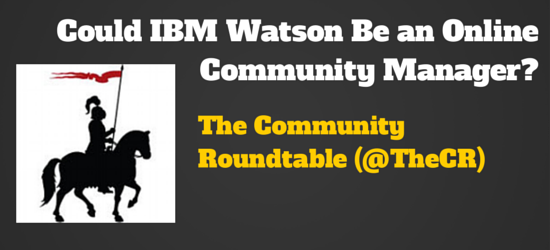
A human would spend years performing these tasks. If you attempted to read every single post and comment in your online community, it would take you years as well. The team at
The Community Roundtable suggests:
“Just think how wonderful it would be if you could actually read ALL the posts in your community and respond adequately to everything, in a relevant and helpful timeframe!”
Watson could ingest every piece of content generated in your online community and figure out which require a response (or action). The team at The Community Roundtable suggests that Watson could be useful as a trend discovery tool in online community:
“In one of the communities we work with, the word ‘login’ has been a hot topic. But chasing down which login scenario (out of dozens) is being problematic and other pertinent information is time consuming. Can someone gather it for me, maybe Watson?”
Intelligent Member Management
The brains of most community managers are not hard-wired to run Excel macros and pivot tables. We use computers to do that sort of stuff. Just as we create a spreadsheet to answer a question or validate a hypothesis, we can give software (like IBM Watson) some interesting assignments with regard to member management.
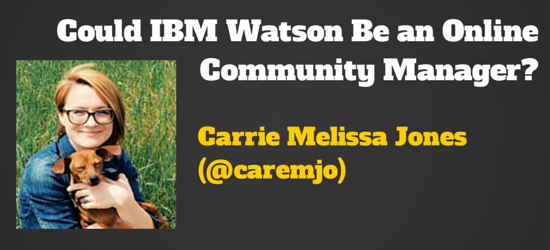
These ideas are from
Carrie Melissa Jones (in her words):
Member Engagement and Recruitment
By analyzing massive amounts of customer data, Watson could do things like analyze customer behaviors to identify key trends in engagement. A human could follow up by brainstorming ideas for how to deepen that engagement. In addition, search and discovery of new community members could easily be automated.
Identify Potential Advocates
Show us our customers who feel the most positively about us and are most likely to share online, so we can reach out and write handwritten thank you notes.
Face-to-Face Event Recruitment
Geolocate people to invite to events and then organize a meetup.
Content Discovery
Tell us what our customers have in common to aid starting conversations, so we can start the topic in our discussion group. In addition, Watson could point out key turning points in the community, so we can tell the community story.
Predictive Analytics
Give us a heads up when we're about to lose a customer based on data trends.
Create a Center of Excellence for Community Professionals
What if we provided a version of IBM Watson that all community professionals could tap into? We’d feed it real-world data and questions and Watson would kick its artificial intelligence into high gear. Over time, it would get smarter about community management.
Memorial Sloan Kettering is
training Watson to help doctors make better cancer treatment choices. Here’s how it works:
“Watson will take information about a specific patient and match it to a huge knowledge base incorporating published literature and the treatment history of similar patients. Watson’s ability to mine massive quantities of data means that it can also keep up — at record speeds — with the latest medical breakthroughs reported in scientific journals and medical meetings. Additionally, because it utilizes cognitive computing, Watson continually learns, thereby improving its accuracy and confidence in the treatment options it suggests.”
By consulting Watson, oncologists will be able to make treatment decisions more quickly. There are plenty of situations in which community managers need to make decisions. IBM Watson, using a history of community data and past “cases,” could help us create a Center of Excellence for community professionals.
Not only would it help with individual situations, but it could generate a living history of best practices and results. By training IBM Watson, we can provide a resource that helps community managers make better decisions.
IBM Watson as Online Community Manager: Where It Falls Short
There are a number of aspects of a community manager’s role that cannot be replicated via software. So rest assured, community professionals: a computer will not take your job. At least not yet. Let’s take a further look.
Watson Lacks Empathy
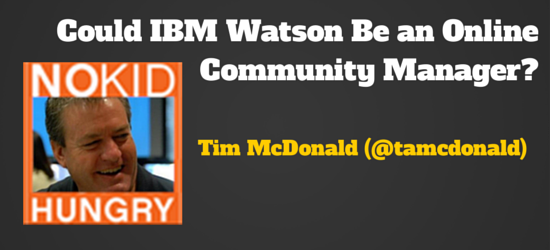
Empathy is defined as “the intellectual identification with or vicarious experiencing of the feelings, thoughts, or attitudes of another.” Human beings can exhibit empathy, computers cannot.
Tim McDonald says it quite well:
“Having knowledge of the past is one thing. Understanding the complexities of human behavior and how we are all unique is quite another. I don't think any computer understands empathy.”
When we were injured or sick as children, our mother, father, aunt or uncle would comfort us. And we knew instinctively that our pain was their pain, that they felt for us. Members want a similar relationship with their community: they want to know that when they encounter issues or concerns, that others know and understand their situation and perspective.
As the team from The Community Roundtable puts it:
“Until a computer can intuitively understand what a person is dealing with, and react appropriately and with empathy, community management will remain a human-centric endeavor.”
Watson Just Isn’t Human
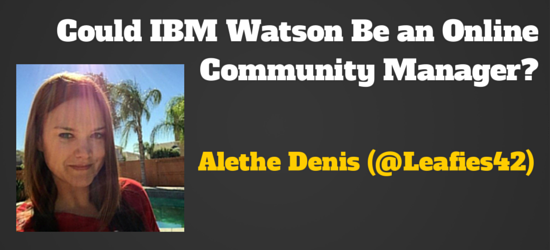
You engage in a text-based chat. By asking a series of questions and reading the answers, are you able to tell the “person” on the other end is a computer? If you can’t tell the difference, then the computer just passed the
Turing test.
The problem is that computers lack the human touch. According to
Alethe Denis:
“People are very in tune with automated responders and emails. The
uncanny valley theory plays a great role in this revulsion. Instinctively humans can feel something about an automated response is not right or genuine, and they respond in a negative way, even if the message is polite and positive.”
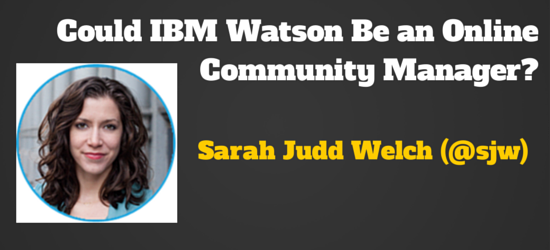
In addition, Watson is rooted in the logic of a software program. It’s completely predictable. And while unpredictability (in humans) can frustrate us at times, it is part of the human condition. And sometimes, it makes things more exciting.
As
Sarah Judd Welch shares:
“While humans might behave rationally in the aggregate (at least, according to economic theory), most humans don't act rationally in all situations day to day. We're often irrational and imperfect in our decision making, and I don't think that wild-card factor could ever be programmed.”
Infographic: Traits of Community Managers
For a look at other community management traits that are unique to humans, check out our infographic:
Seven Criteria for Hiring Online Community Managers from DNN
Watson Can’t Serve as the Bridge Between Community Members and Your Organization
In a DNN webinar, I noted that community managers sit squarely between the community and your organization (check out our
SlideShare for more context). On the one hand, you wear your “empathy hat” to understand the needs, concerns and desires of community members.
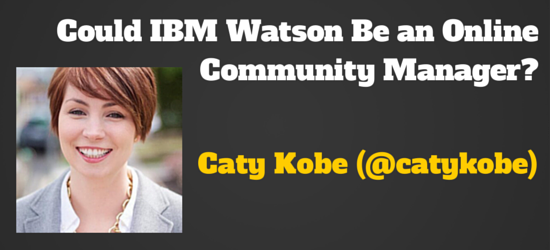
On the other hand, you wear your “navigating the organizational waters” hat to communicate the community’s needs across your organization (e.g. Executives, Product, Sales, Engineering, etc.). And beyond communicating, you see these issues through until implementation, delivery and resolution.
As
Caty Kobe notes:
“I don't think Watson can yet replicate the inter-personal skills and influence required by a community manager to push community initiatives across departments. I've always seen community holistically, and not as one particular department or function within an organization. There's a lot of negotiation and political savvy that comes into play when working at that level.”
The Verdict on IBM Watson as Community Manager
FINAL VERDICT: No.
Automation is an active area of discussion right now (see this related video,
Humans Need Not Apply). All professions are facing the existential question, “Will my job be automated?” While my survey is biased (i.e. I reached out exclusively to community professionals), there was a clear consensus that human elements (e.g. empathy) are core to the mission of community management.
Until computers replace humans as community members, human beings will play an essential role in online community management. After all, community managers foster connections and bring people together. Do we really want a computer to play that role?
On a closing note, I leave you with a question that I sent to one of our contributors, Caty Kobe:
Q: What attributes could Watson developers add to make it closer to a fully-functioning (human) community manager?
A: A heartbeat.